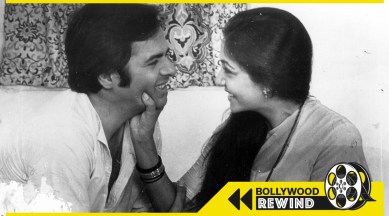Click here to follow Screen Digital on YouTube and stay updated with the latest from the world of cinema.

We tend to look at the past with rose tinted glasses. Nostalgia makes us ignore the cracks that would be evident if we had a more objective viewpoint and this is probably why while watching older movies, we tend to make exceptions and often present ourselves with the argument ‘this was another era’. Even the so-called progressive films, or the kind that were seen as progressive decades ago, don’t necessarily hold up anymore and one of those films is Raman Kumar’s 1982 film Saath Saath, starring Farooq Sheikh and Deepti Naval.
Saath Saath’s premise follows newly weds Avinash (Sheikh) and Geeta (Naval) who have just entered the middle-class after living a pretty fancy lifestyle for most of their lives, and now appear to be romanticising poverty. As they live in a one-room house singing ‘Yeh ghar bahut haseen hai’, you get a sense that none of them have really lived within limited means and are thus fascinated by the ‘joys’ of doing household chores and working regular jobs.
Avinash grew up in a zamindar’s house and Geeta grew up in a business family. He now writes for a living, but his stories and articles are rejected by publications on account for being a little too truthful. When Geeta meets him, she is fascinated by the concept of working tirelessly to earn money, which itself, tells you about the bubble that exists around her. As the two get jobs that don’t allow them to spend much time each other, we see a montage that feels almost manipulative as it seeks sympathy from the audience, which is quite an unfair ask. The life that’s shown as ‘harsh’ for them, is just regular life for middle-class families but the film paints their day-to-day chores as struggles and you can’t help but wonder that if Zoya Akhtar made this film, she would be criticised for it the same way she was judged for Gully Boy.
Raman Kumar presents Avinash as the kind of person who detests capitalism. He would rather live within meagre means than sell his soul to the devil. Avinash’s arc has him turning from an idealist to an opportunist but even during his idealistic days, Avinash isn’t all that he is hyped up to be. When his wife gets a stable job, it’s a blow to his ego. She doesn’t hesitate to call him out on it and says ‘Chaar kitabe kya padh li, lagta hai mard ko hi kaam karna chahiye. Kuch nahi, bas male ego hai,’ but Avinash doesn’t seem very convinced. When his wife is pregnant and Avinash has to get a job that might compromise his morals, he takes it on saying he has to be the ‘man of the house who should be capable of taking care of his wife and child’.
“Don’t become a philosopher before you become rich,” Shah Rukh Khan once said, and this film is the movie version of that quote. Avinash isn’t all that woke to begin with but as he starts working under a capitalist publisher, his morals witness a steep decline. He starts to make peace with that because he is finally aware why his zamindar father and dishonest father-in-law do what they do, but for Geeta, this is a deal breaker. Her arc is more satisfying here because at least she sticks to her newfound principles unlike Avinash who has dilly-dallied several times.
As Geeta threatens to leave Avinash because of his compromised principles, he asks her to stay for one more night because they are expecting some guests. She is dumbfounded by the argument but stays for another night and voila, next morning, Avinash is a transformed man. His dilly-dalliness returns and even though the film ends on a happy note, you know that Avinash will change his mind in the near future once again.
Saath Saath wears a garb of progressiveness because it looks down on capitalism and pretends to be the story of the hardworking middle-class. But in fact, Saath Saath is the story of two privileged individuals who choose to believe that money isn’t all that it’s cracked up to be.
Click here to follow Screen Digital on YouTube and stay updated with the latest from the world of cinema.